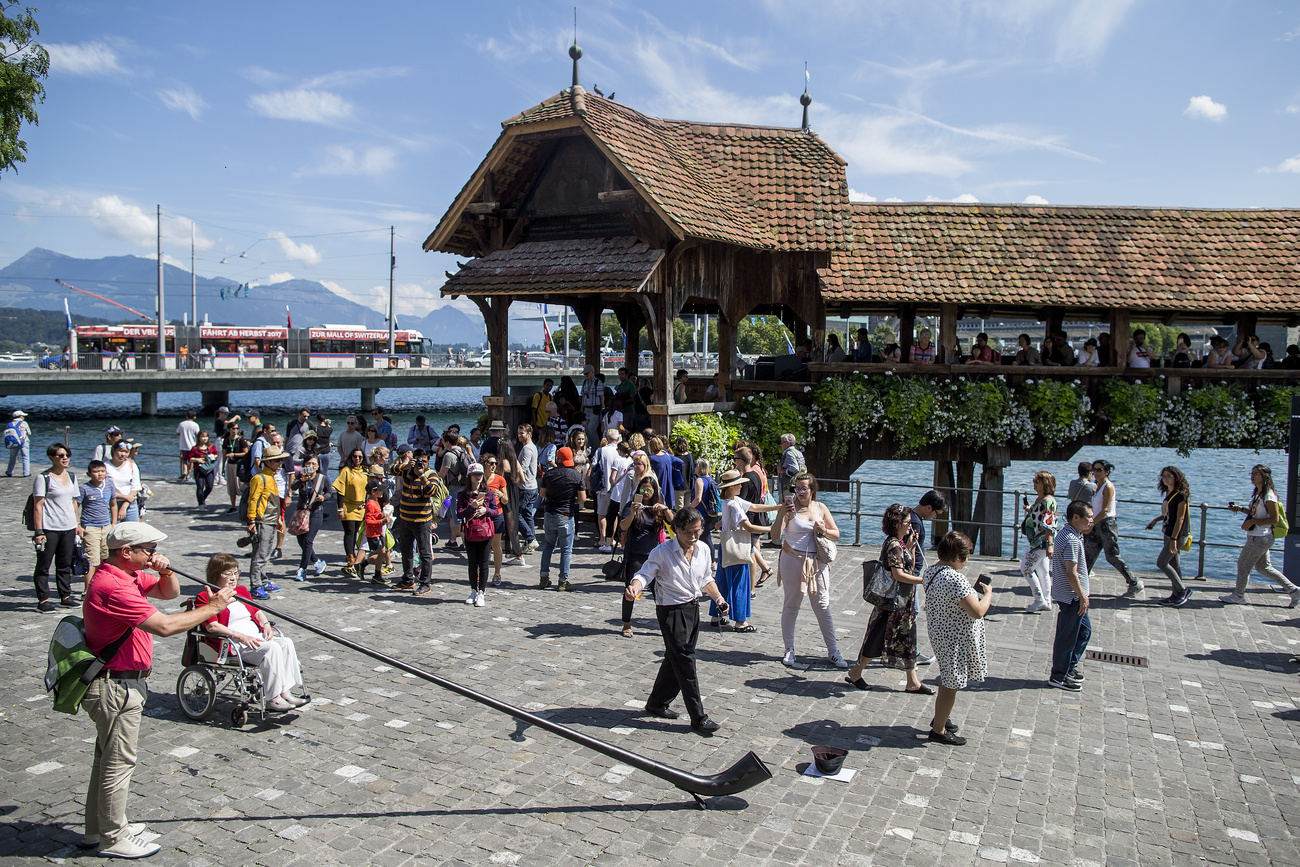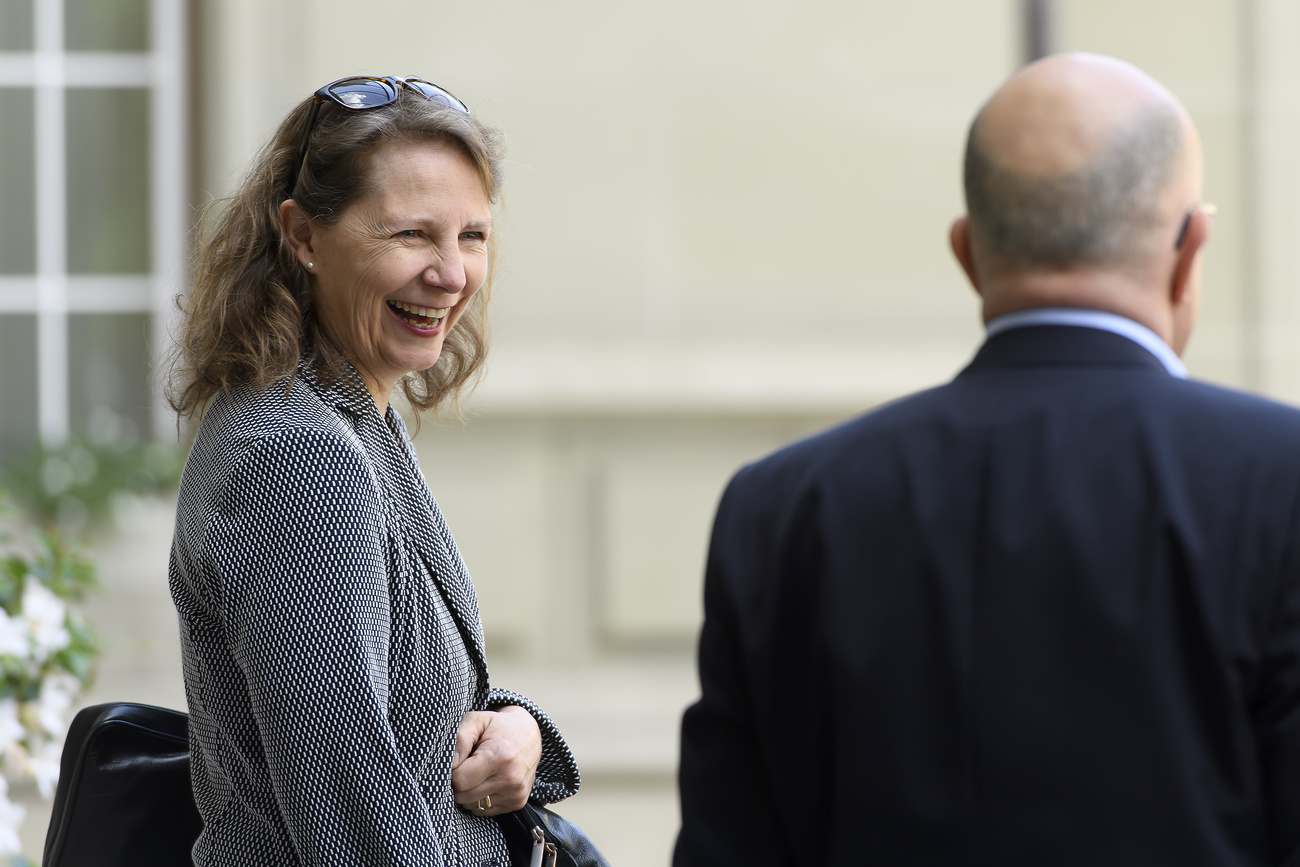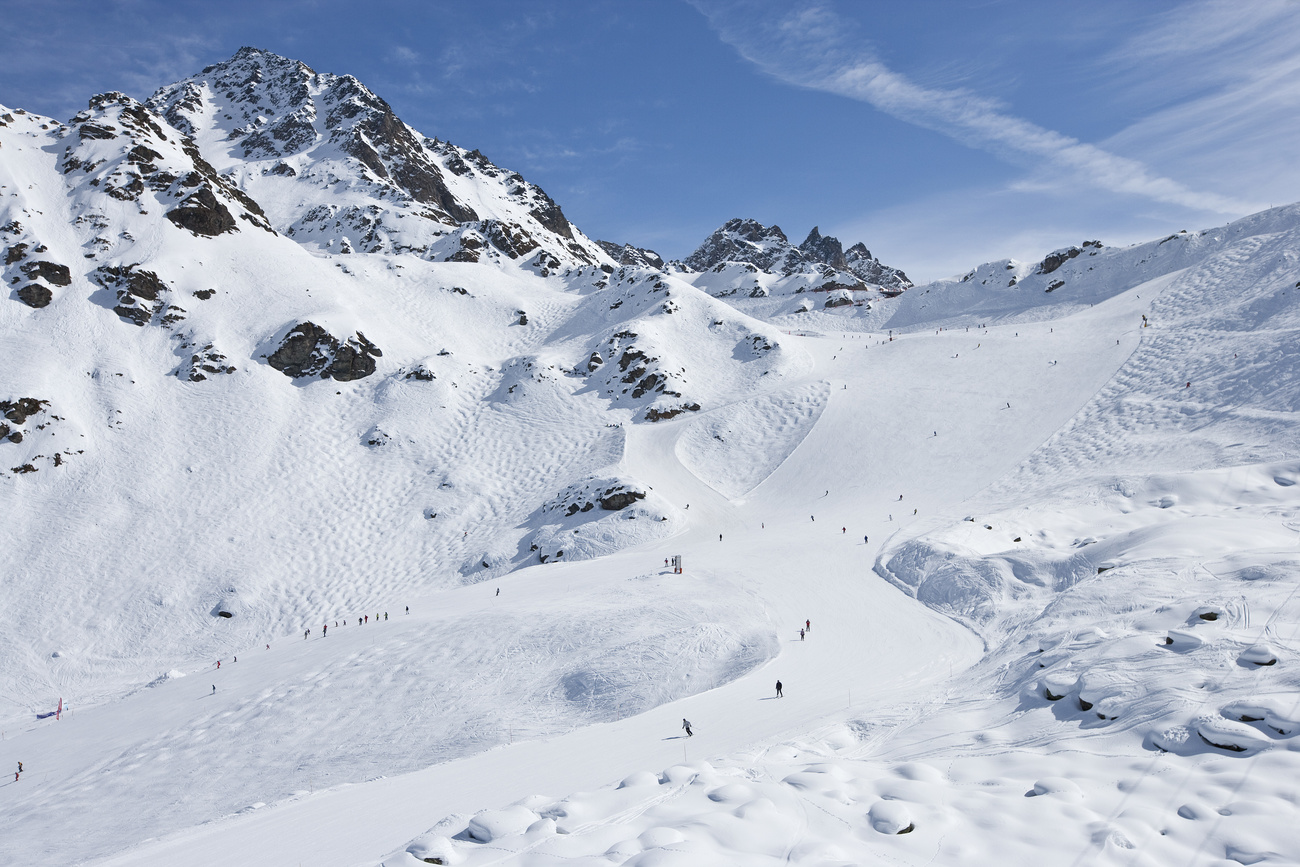
‘High costs are not prohibitive for premium destination Switzerland’

The president of the Swiss tourism marketing body is optimistic about the future of the industry. In an interview with SWI swissinfo.ch, Brigitta M. Gadient explains why and also addresses issues of high costs and overtourism.
Among the key tourism organisations in Switzerland, the federal corporation Switzerland Tourism occupies a special place.
This organisation has the mission of promoting Switzerland around the world as a travel destination for holidays and conferences.
At the head office of Switzerland Tourism in Zurich, SWI swissinfo.ch spoke to Gadient, the organisation’s president since 2020.
A lawyer by training, Brigitta M. Gadient (63) is a native of Graubünden, eastern Switzerland. She was a member of the Swiss parliament (representing the Swiss People’s Party, then the Conservative Democratic Party) from 1995 to 2011. As well as sitting on the board of several corporations and foundations, she has been president of the Haute école spécialisée des Grisons (Graubünden technical college, FHGR) since 2017. Gadient has been president of Switzerland Tourism since 2020.
SWI swissinfo.ch: This summer, there was talk of tourist destinations in Switzerland being overrun, like the village of Lauterbrunnen in Bern. Does the prospect of overtourism bother you?
Brigitta M. Gadient: Fortunately, we don’t have overtourism in Switzerland, unlike cities like Venice and Barcelona, where cruise ships dock. The average occupancy rate of hotels in Switzerland is only 45%.
In addition, our promotional activities are aimed at spreading out tourists over the whole country and throughout the year.
Of course, it’s not possible to avoid occasional influxes of tourists, but the local authorities are able to manage these out-of-the-ordinary situations quickly and efficiently.

SWI: How do you see the future of tourism in Switzerland?
B.M.G.: I am very optimistic because this country has so many advantages – the purity of our countryside and the beauty of our cities. Our infrastructure is exceptional. I am thinking of the reliability and punctuality of Swiss trains. Of course, our sustainable approach is appreciated more and more by many tourists.
What’s more, tourism is the nation’s fifth-biggest sector in terms of export revenue. In the Alpine cantons like Graubünden, where I come from, tourism is of vital importance.
As for our high costs, they are a challenge to be sure, but they are not prohibitive for a premium destination like Switzerland.
Parliament has approved funding for Switzerland Tourism for the next four years (a maximum of CHF233 million or $258 million). Are you happy with what you’re getting?
B.M.G.: Not at all! The increase of three million compared to the previous four years is in fact a significant reduction, especially as inflation is now running over 10% in our foreign markets.
Actually, our missions and activities just keep growing, with, for example, the promotion of sustainable tourism. In fact, we have been dealt budget cuts all over the place. We are going to have to tighten our belts.
SWI: That still represents a fair amount of money for your promotional campaigns. Aren’t tourist numbers due to the actions of other organisations too, or even just to the reputation enjoyed by Switzerland?
B.M.G.: In our marketing strategies, we don’t take a scatter-gun approach but a highly targeted one. For example, one of our initiatives might have the objective of attracting a particular segment of tourists from a particular country, at a particular time of the year, and with a particular region of Switzerland in mind.
Another promotional activity might be to get visitors to stay longer in Switzerland than the average stay. Thanks to this targeting, we’re able to evaluate with some precision the effects of these initiatives.
SWI: In general, are you mainly trying to attract local tourists as a priority, those from neighbouring countries, or those from countries further away?
B.M.G.: In response to the pandemic, we’ve developed a strategy to strengthen the resilience and flexibility of our tourism industry. In other words, we are trying to establish a balance of tourist flows based on where they’re from, with 45% of tourists residing in Switzerland, 35% coming from neighbouring countries and 20% coming from further away.
SWI: What is the point of dividing your marketing efforts in this way?
B.M.G.: Swiss tourists are a priority because they guarantee stability for the service providers. However, the locals usually travel during the period of school holidays and on weekends and stay more often in holiday apartments.
But many four- and five-star hotels also need customers on weekdays and outside the school holidays. For this reason, we need foreign tourists too, especially those coming from far-away places, even if that can sometimes present a cultural challenge.
SWI: Which of your promotional campaigns are you most proud of?
B.M.G.: Our worldwide campaigns involving Roger Federer, Switzerland’s best ambassador, have been a great success. We showcased train travel to promote sustainable tourism. Of course, many other initiatives that were smaller and more targeted, like the use of influencers, have had very positive results.
The Switzerland Tourism advert featuring Swiss tennis player Roger Federer and American actor Robert de Niro:
SWI: What criteria do you use to allot funding to your offices abroad?
B.M.G.: We have identified four levels: priority markets (which generate a million hotel stays a year), active markets (over 100,000 stays), the “outliers” (with over 40,000 stays) and emerging markets (where the development of numbers of overnight stays is being tracked).
The higher the priority level, the more staff we have on the ground, and the wider the range of things we do; as for the emerging markets, we manage them from our head office in Zurich.
Our biggest overseas operations are in the United States and Canada (18 staff), Germany (17), “Greater China” [mainland, Hong Kong and Taiwan] (12), and Britain and Ireland (11).

More
Economists sees little tourism growth after a record summer
SWI: And yet out of the 270 employees of Switzerland Tourism, 52% are based at the head office in Zurich rather than out in the field. Is this proportion justified?
B.M.G.: I believe so, because many support activities for our international operations are provided from headquarters. I am thinking, say, of the production of promotional materials.
SWI: Switzerland Tourism works for the whole of Switzerland. How do you divide up your efforts to ensure you serve each region fairly?
B.M.G.: We maintain a constructive dialogue with the 26 cantons divided into 13 tourist regions. We offer all of them a basic service paid for by the federal government, but on top of this, each region – or rather, each group of regions – can pay for further services tailored to their particular needs.
So the Matterhorn region often shows an interest in far-off countries whereas other Swiss regions prefer to concentrate on particular European countries.
The important thing is to make sure we coordinate our activities at the national level so that we can maximise our global impact. Some regions would like more services, but it’s in the nature of things to always want more.
You were a member of parliament for 17 years. As president of Switzerland Tourism, do you find that experience useful?
B.M.G.: Certainly! That experience gave me a detailed understanding of the approval process for our budget, 56% of which is financed by the federal government. What’s more, I know a lot of parliamentarians and federal civil servants, which is very useful.
Edited by Samuel Jaberg. Translated from French by Terence MacNamee/gw
More

In compliance with the JTI standards
More: SWI swissinfo.ch certified by the Journalism Trust Initiative






























You can find an overview of ongoing debates with our journalists here . Please join us!
If you want to start a conversation about a topic raised in this article or want to report factual errors, email us at english@swissinfo.ch.